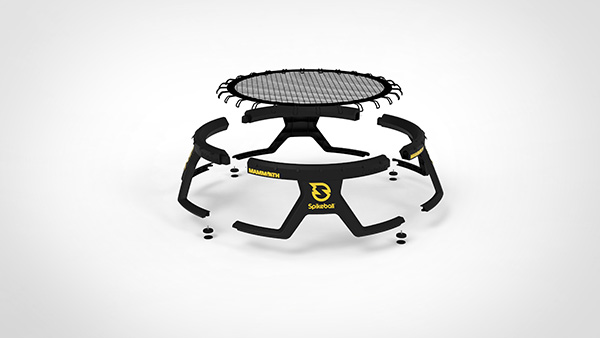M4 Factory & Design Lab has designed and manufactured a new Spikeball game kit for elite players using 100% recycled resin.
M4 Design Lab, the in-house creative studio at M4 Factory, has collaborated with Spikeball to launch a new product. The Mammoth game kit was developed for elite roundnet players, designed to be Olympic quality with the ultimate in stability, durability, and optimized game play.
The kit set a new precedent in product design for Spikeball, taking cues from sports cars and other sleek sports equipment. “We wanted it to look sporty and futuristic,” said Kyle Swen, Chief Creative Officer of the M4 Design Lab. Swen is an award-winning industrial designer and was a founding Partner at Astro Studios, a San Francisco-based design consultancy, before joining M4.
The M4 team also collaborated with Skyler Boles, former national roundnet champion, on the design of the set. “Skyler was the perfect design partner because he knows the game inside and out. He brought in some invaluable insight that made the design stronger,” said Swen.

From the Spikeball site: “It’s the toughest, handsome-est, most innovative Spikeball product ever created. Designed and made in the US from 100% recycled plastic, it delivers longer rallies and more fun.”
The Mammoth set also marks the first product from the company to be manufactured in the United States. M4 Factory is located in Chicago, which is also the location of the Spikeball headquarters.
The plastic parts of the game are made from 100% recycled ABS resin. ABS is a type of thermoplastic that can be melted and reformed many times without losing functionality. By utilizing post-industrial waste, no new petroleum plastic was created to produce the product. The shift to recycled and bio-based resin aims to “turn off the tap” of virgin fossil fuel plastics and move towards a circular economy.
The first 1000 pieces, which sold out on pre-sale almost immediately, will be laser etched and numbered to commemorate the launch.
The M4 Design Lab partners with clients to bridge the gap between product design and future materials, experimenting with innovative bio resins and recycled resins to test viability in manufacturing. Earlier this year, the Design Lab collaborated on an injection molded chair made with hemp resin that was presented at Alcova during Design Week Milan.
The combination of design and production under one roof uniquely positions M4 Factory to offer a more thoughtful and iterative approach to manufacturing, while pushing the industry forward towards more regenerative materials.
Kyle Swen spoke about the benefits of designing inside the factory: “We were able to work closely with our engineers and production crew to design, prototype and iterate quickly. The whole process is more streamlined and efficient by working together.”
Said Patricia Miller, CEO of M4 Factory, “We are enormously proud of the Spikeball Mammoth set. The commitment made to the development of the set was informed by a customer first business model Spikeball lives by and M4 Design Lab’s focus on future material usage, elevated design and uncompromised quality. To execute the design in our Factory with recycled materials and a smaller carbon footprint reminds us of the value of integrating design and manufacturing.”
ABOUT M4
M4 Factory is a woman-owned and led, design-driven, world-class, full-scale production facility in Chicago. Established in 1975, M4 is on a mission to advocate for better plastics, the circular economy and American manufacturing.
The M4 Design Lab operates within the factory as the in-house creative studio and launch lab. The lab champions environmentally responsible material alternatives through research and experimentation.
ABOUT SPIKEBALL
Spikeball launched in 2008 with a mission to bring people together through competition and fun. The game has exploded in popularity, with over 5 million players globally.
Scott Ellyson, CEO of East West Manufacturing, brings decades of global manufacturing and supply chain leadership to the conversation. In this episode, he shares practical insights on scaling operations, navigating complexity, and building resilient manufacturing networks in an increasingly connected world.